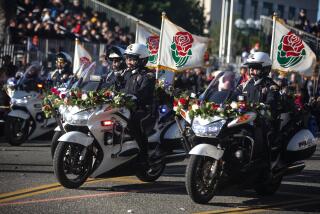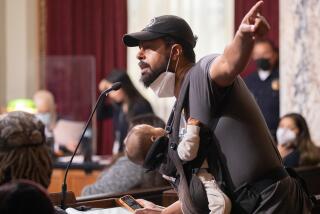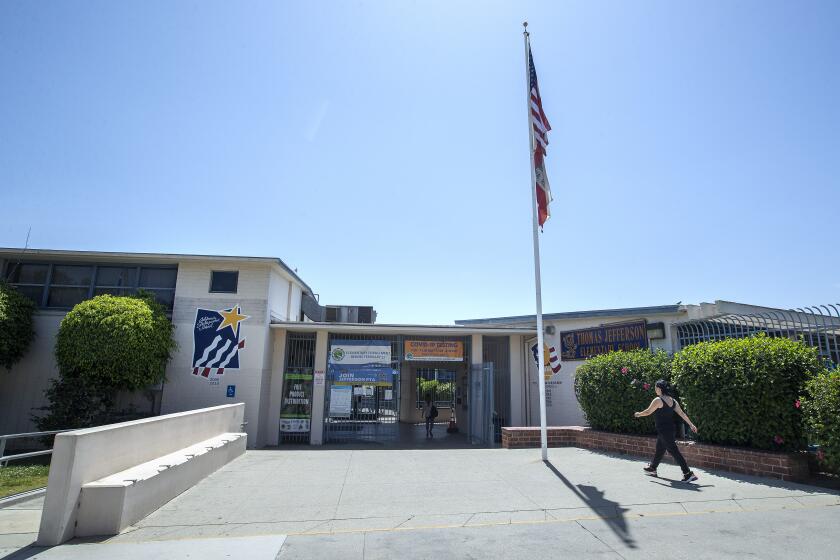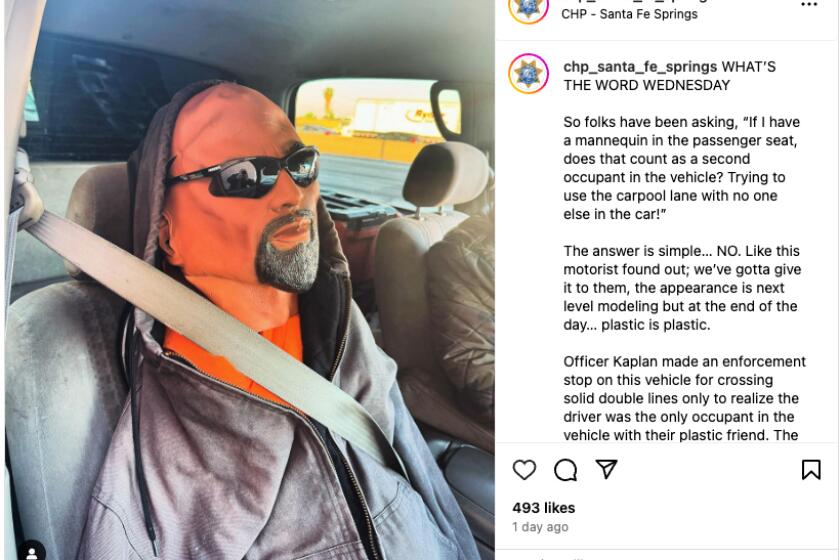First & Spring: Critics decry contributions to Councilman Englander from Taser execs seeking LAPD camera contract
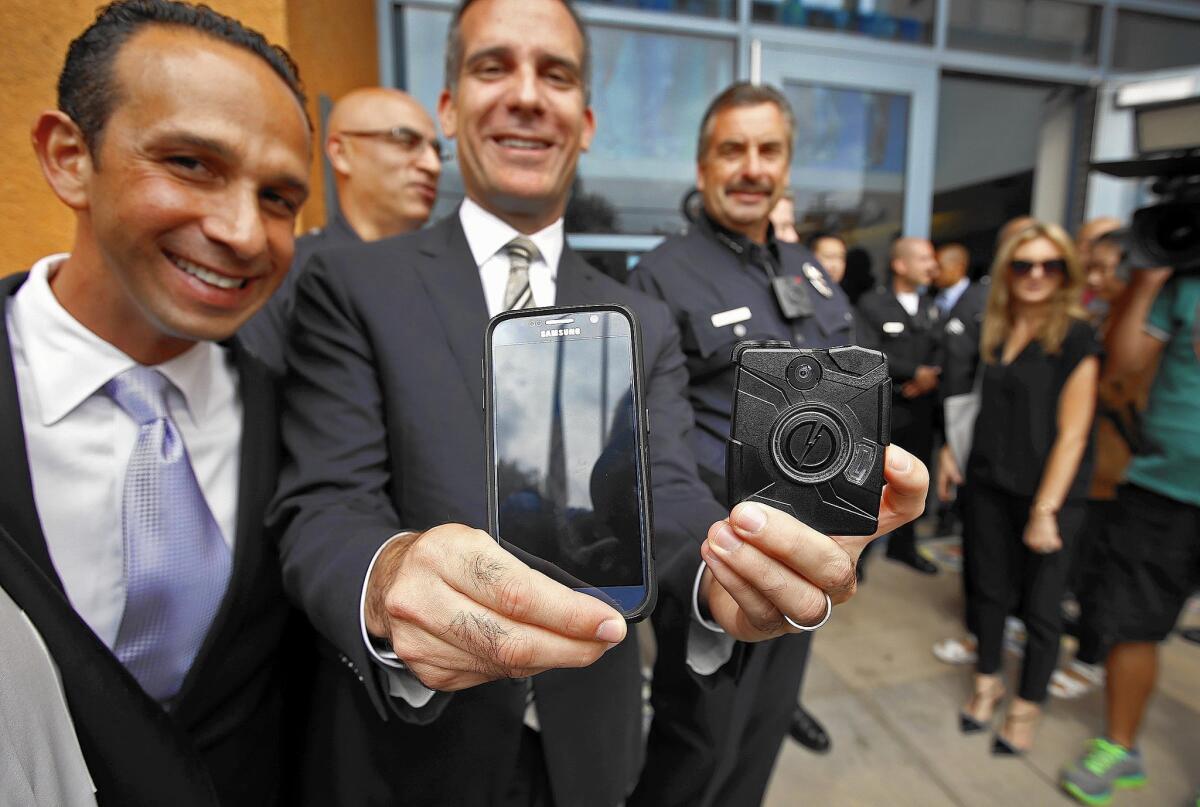
Councilman Mitch Englander, left, with Mayor Eric Garcetti, accepted campaign donations from Taser International executives. The firm is seeking an LAPD camera contract.
L.A. voters went to the polls in 2011 to crack down on what some referred to as “pay to play” practices at City Hall, passing a measure to limit the political influence of companies that seek government business.
Measure H, backed by then-Councilman Eric Garcetti and an array of good-government types, prohibits firms seeking lucrative city contracts from making campaign contributions to the politicians who have final say over those agreements.
But that law may prove to be toothless in the case of Taser International, the Scottsdale, Ariz., company currently up for a $31.2-million contract to provide thousands of body cameras to the Los Angeles Police Department.
Last year, a dozen donors affiliated with Taser, half of them company executives, put $8,400 into the reelection bid of Councilman Mitch Englander. Englander heads the council’s Public Safety Committee, which recently reviewed the effort to buy 6,140 cameras and 4,400 Tasers. Nevertheless, he says the campaign money is not covered by the ballot measure’s restrictions.
At the time the money was given, “Taser was not subject to Measure H because they were not bidding on a contract or responding to any solicitation by the city,” said Englander spokeswoman Stephanie Saporito in an e-mail.
Critics contend Taser was already in the process of seeking work from the city when the donations were made. Englander, who represents the northwest San Fernando Valley, accepted the contributions in June 2014, when Taser and a competitor were already several months into a field test of their body camera equipment at the LAPD.
That testing period helped lead to the department’s decision to recommend Taser as its body camera vendor. But under the city contracting rules, that test was not considered a formal bid process.
Kathay Feng, executive director of the campaign finance watchdog group California Common Cause, said the fact that a competition was underway — one involving Taser — shows that the contributions to Englander violate, at a minimum, the spirit of Measure H.
Englander “should not have been soliciting campaign contributions … knowing there was a process underway,” said Feng, who signed the ballot argument in favor of Measure H.
Taser officials did not respond to requests for comment from The Times. Arnie Berghoff, a lobbyist for the company at City Hall, said Friday that Taser executives were unavailable because of the holiday season.
Under Measure H, companies are barred from giving to elected officials at City Hall once they turn in a bid for work valued at more than $100,000, according to the city’s campaign finance ordinance. The measure punishes donors, not politicians, for engaging in such activities. Companies found to have broken the law can be barred from competing for city work for up to four years, depending on the number of violations.
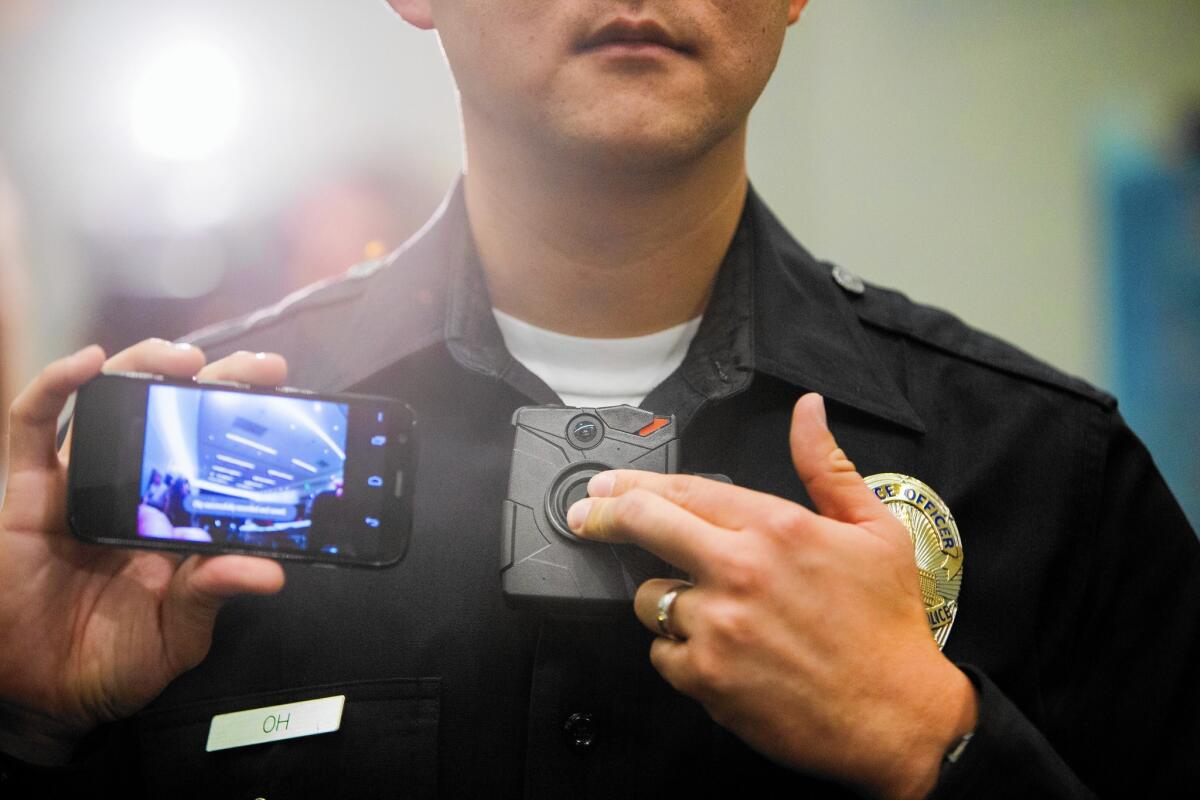
An LAPD officer holds a live-view device, left, which works with the new Taser Axon on-body police cameras. The city plans to buy 6,140 cameras and 4,400 Tasers for its officers.
Ethics Commission records did not show donations from Taser executives to any other elected official at City Hall.
The City Council had been scheduled to vote last week on Taser’s body camera contract, which is backed by Mayor Eric Garcetti and police Chief Charlie Beck. Council President Herb Wesson postponed the meeting after hearing concerns from his colleagues about the initiative, which is expected to cost $57.6 million over five years. Beyond the $31.2-million Taser contract, the city anticipates spending an additional $26.4 million to cover other technology and expenses for full deployment of the cameras.
Councilman Bob Blumenfield said he experienced “sticker shock” after learning that more than 100 officers may be needed to oversee the program. Councilman Mike Bonin announced he was “totally freaked” out over the potential drain on LAPD resources.
Englander, in contrast, said last week that he would “fully recommend” the deal to his colleagues. “I think you have done a phenomenal job,” he told LAPD officials.
Over the last three years, Englander has repeatedly pressed for the LAPD to obtain body cameras, describing the devices as a way to reduce costly legal payouts over allegations of misconduct.
In September 2013, Englander drafted a proposal to have Taser test its on-body camera equipment at the LAPD, calling the company “a leader in the field of on-officer video.” Two months later, LAPD technology officers appeared before Englander’s committee to say they planned to let both Taser and a competing company, Coban Technologies, offer their cameras for the study.
In January 2014, Englander announced his support for that strategy, saying in his weekly newsletter that his committee wanted a report on how to implement the cameras throughout the department. “This field study is the result of my September motion directing the Los Angeles Police Department to work with Taser International,” he wrote.
Five months later, Englander flew to Phoenix for a campaign fundraiser, according to campaign records. He later reported receiving a dozen donations on June 7, 2014, during the time of that trip. Those donations included money from Taser executives and their family members, as well as a contribution from a manager with Evidence.com, the entity that’s expected to provide storage for the LAPD’s video footage.
After the test was completed, LAPD officials concluded that Taser had the preferred product, said Maggie Goodrich, the department’s chief information officer. The LAPD decided not to conduct its own bidding process, relying instead on a procurement process carried out by Kern County, which signed an agreement with Taser for body cameras in September.
That arrangement prompted one software company to accuse Los Angeles of offering Taser a “no-bid” contract. But both Englander and the LAPD disputed that notion, saying Taser and Coban competed to show they had the best product.
“We certainly went through a competitive process early on, before Kern County” issued its own request for bids, Goodrich said.
Studio City resident Eric Preven, a critic of the body camera selection process, said voters should close loopholes in Measure H to make sure contributions are barred during such testing periods. When Taser executives contributed to Englander, they were trying to get LAPD business, he said.
“They should be punished,” he added.
More to Read
Start your day right
Sign up for Essential California for news, features and recommendations from the L.A. Times and beyond in your inbox six days a week.
You may occasionally receive promotional content from the Los Angeles Times.
